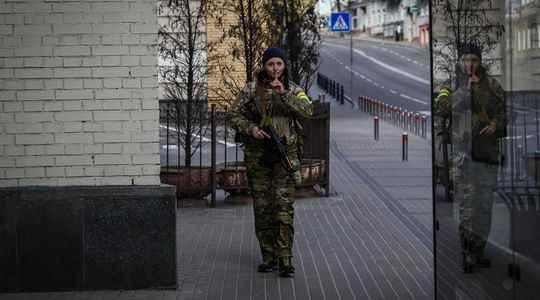On the fourteenth day of the invasion by the Russian armed forces, Ukrainian soldiers are suffering but still holding Kiev, the capital, and preparing for battle in the streets of Odessa, the country’s largest port, on the shores of the Black Sea. Despite their numerical inferiority and the lack of equipment, even if deliveries are underway from Western countries, volunteers continue to swell the Ukrainian ranks, where they are trained in the emergency handling of weapons. At the same time, humanitarian corridors have been defined to evacuate civilians from the bombarded areas, from Energodar to Zaporozhye, from Izium to Lozova and from Sumy to Poltava. Tuesday, March 8, a corridor had already allowed the evacuation of thousands of citizens.
Anastasia Fomitchova is a doctoral student in political science at the University of Paris 1-Panthéon Sorbonne, where she is preparing a thesis. equally Junior Research Fellow in the European Research Council project Social Dynamics of Civil Wars, she has already written about the Ukrainian volunteer battalions and their relationship to the state. She talks to L’Express about the place of women in the army and in territorial defense units in Ukraine. Maintenance.
L’Express: How do you explain the high proportion of volunteers in the Ukrainian army? More specifically, what place do women occupy in it?
Anastasia Fomichova: In 2014, after the annexation of Crimea, public administration buildings were taken over by armed groups in eastern Ukraine. They also coordinated the first separatist movements until an anti-terrorist operation was launched by the Ukrainian central government. At the time, there was not really an army in the country. It had been demilitarized, had suffered budget cuts. The forces had been reduced, the armament sold. Those who were able to take over the defense of the country were volunteer battalions. You have to understand that the army is in the image of Ukrainian society: it was built from below. These volunteer battalions, which benefited from the support of the Ukrainian state, were integrated into the regular army from 2016. At the time, there were 20% women in the army.
Today, we find the same dynamics. On January 1, 2022, President Volodymyr Zelensky created the Territorial Defense, which is also under the authority of the Minister of Defense. The volunteers who sign up do so with the military enlistment offices of their district, their neighborhood. Indistinctly, there are men and women. Without being able to justify it, I would estimate the number of women at more than a third among the volunteers. They join combat units as well as those dealing with logistical issues, the redistribution of aid…
All women, precisely, do not necessarily have weapons in hand. What are their roles in this war, on the front and second lines?
There is a very strong mobilization at all levels. The commitment results from the individual will of each one. There are women on the front line, others on the second line, who provide logistical support. Ukrainian women are also very numerous in the medical and paramedical units which take care of the evacuation of the wounded, civilians and combatants from the combat zones. And other women are in the back to help make Molotov cocktails, bulletproof vests or to collect aid to redistribute.
How do you analyze the images, very publicized, showing women and children fleeing the country while the men stay?
The fact is that it is impossible for all men of draft age, that is to say over 18, to flee the country. We have seen that many men brought their wives and children to Lviv, or as close as possible to the Polish border, before returning and enlisting. They took their families to safety. But there are also many women who have chosen to stay and enlist because their husbands have made the same choice.
How has the place of women in Ukrainian society evolved in recent years, especially after the Maidan protest movement and the start of the conflict in the Donbass? Do they also have more access to high positions in the military ranks?
There are some really good career paths for women, who become battalion commanders. The units, too, are mixed. From a purely societal point of view, Ukraine was rather, until 2014, a patriarchal society, quite conservative, traditional… The involvement of women at the time of Maidan and then in the war completely upset this order. Today, we have switched to a more modern, Western configuration. There is no barrier to accessing positions of power in the army for women.
On the Russian side, the war seems to be a man’s affair. Masculinity is very present in the army, among decision-makers, around the figure of Vladimir Putin… Where are the women?
They are at the back. Above all, the mobilization of soldiers’ mothers has counted a lot in previous wars. The Russian strategy has always been not to say where the young men, the military, were sent. The mothers in the back are trying to find out what happened to their sons.
Can they influence the Russian authorities to put an end to the invasion?
I won’t be able to tell. Today, there is a very strong repressive policy in Russia, compared to the mobilizations. Vladimir Putin presented the invasion as an ordinary military operation, with real control of information. But it circulates despite everything, opponents are arrested. Let’s say that the mobilizations of soldiers’ mothers will surely be, in this context, quite structuring.
